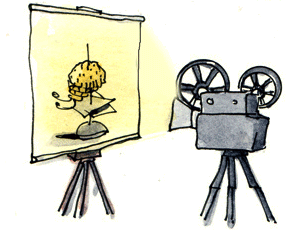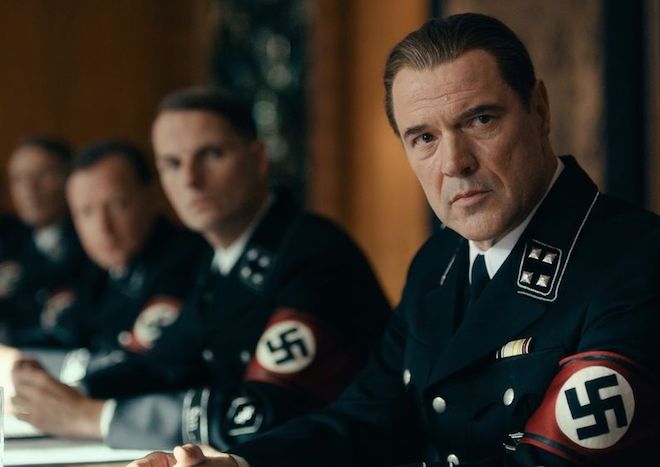Never Look Away
 Critics' Corner,
Critics' Corner,  Miss Lumière •
Miss Lumière •  Thursday, July 18, 2019
Thursday, July 18, 2019 A new film from the maker of Lives of Others ... Portrait of a young artist in Germany during and after the war ... Sterilisation of the "unfit" ... The aunt, the artist, the Nazi doctor and his daughter ... A romantic epic about art, love and war, reviewed by Miss Lumière
 IT'S almost impossible to avert one's gaze from Never Look Away - a sumptuous, handsome, absorbing and sometimes chilling look at art, love, cruelty and politics from German auteur, the impossibly named (and maned) Florian Maria Georg Christian Graf Henckel von Donnersmarck.
IT'S almost impossible to avert one's gaze from Never Look Away - a sumptuous, handsome, absorbing and sometimes chilling look at art, love, cruelty and politics from German auteur, the impossibly named (and maned) Florian Maria Georg Christian Graf Henckel von Donnersmarck.
Just five minutes in, Miss Lumiere knew she was in the hands of a master.
The scene in which an emotionally fragile young woman stands before a row of school buses in order to experience the ecstasy of the simultaneous blowing of their horns, sets up all of Henckel von Donnersmarck's preoccupations in one spine-tingling moment.
The young woman is Elisabeth (Saskia Rosendahl) aunt of the film's central character Kurt Barnert, then a boy witnessing something he doesn't understand.
She tells him:
"Everything that is true is beautiful - never look away Kurt."
Kurt will come to understand much more terrible truths throughout the three-hour epic, which might easily be subtitled portrait of the artist as a young artist.
Henckel von Donnersmarck's previous film was the brilliantly realised Lives of Others, produced in 2006 and starring the mesmerising Sebastian Koch.
This fine actor brings a similar sense of authenticity and deadly seriousness to his role in Never Look Away, albeit invoking a very different character - that of Nazi gynaecologist and mass steriliser of those deemed "unfit", Professor Carl Seeband (Heinrich Eufinger in real life).
Your reviewer found him utterly compelling, and not only because he bears an uncanny resemblance to Australia's own example of power abused, Cardinal George Pell.
Seeband, a more handsome version admittedly, conveys all of Pell's arrogance, coldness and sense of superiority – oh, to look away.
Seeing, not seeing, insight, wilful blindness and the amorality of political allegiance as a way to live, lie at the heart of this film.
It's a heady and sometimes overwrought mix propelled by the story of a young artist coming to maturity over more than four turbulent decades covering the Third Reich, socialism and liberal capitalism.
 Sebastian Koch as Professor Seeband, the Nazi gynaecologist and steriliser
Sebastian Koch as Professor Seeband, the Nazi gynaecologist and steriliser
Kurt's story is based on the early life of Germany's most successful post-war artist, Gerhard Richter, although Henckel von Donnersmarck has taken a number of liberties in the construction of his narrative.
The story of Richter's young aunt being confined to a sanatorium in 1937 and subsequently "relieved of her meaningless existence" by the Nazi euthanasia policy is accurate.
It is also one of the most terrifying sequences in the film.
Coincidence plays an extraordinary - and true part in the story - which sees Kurt (sensitively portrayed by Tom Schilling) unknowingly fall for Seeband's beautiful daughter Elisabeth, or Ellie (a bewitching Paula Beer).
Their love takes them from East to West Berlin, where Kurt studies at the Dusseldorf Academy of Art and eventually finds himself (i.e. his art) by acknowledging his past.
A metaphor for German redemption? Perhaps, but Henckel von Donnersmarck is too subtle, and too smart for such glib analysis.
Seeband, confronted by the (unwitting) truth of his (wholly witting) part in Kurt's aunt's death via Barnert's photo-realist "blur" paintings, is unsettled but not unmasked.
While Never Look Away is merciless in its depiction of human weakness with a visceral disdain for politics, it is shamelessly romantic at heart, championing the freedom of the artist and invoking the final lines of John Keats' "Ode on a Grecian Urn":
"Beauty is truth, truth beauty - that is all ye know on earth, and all ye need to know."
This is nowhere better exemplified than in Henckel von Donnersmarck's sublime rendering of the Allied bombing of Dresden - so terrible and so beautiful one cannot look away.
 Film review
Film review 








Reader Comments